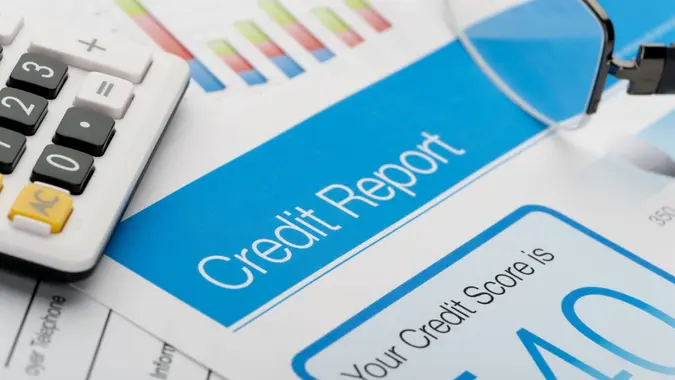5 Ways Your Income Can Hurt Your Credit Score

Commitment to Our Readers
GOBankingRates' editorial team is committed to bringing you unbiased reviews and information. We use data-driven methodologies to evaluate financial products and services - our reviews and ratings are not influenced by advertisers. You can read more about our editorial guidelines and our products and services review methodology.

20 Years
Helping You Live Richer

Reviewed
by Experts

Trusted by
Millions of Readers
According to a survey conducted by PayrollOrg, 78% of Americans live paycheck to paycheck. This means that more people than ever are struggling to keep up with their monthly expenses as the cost of living continues to rise.
As you improve your financial situation, you may need clarification about deciding what area to focus on first to make the largest impact. This is why we’ll explore the connection between your income and credit score to determine the significance of both.
What’s the impact of your income on your credit score?
Can Your Income Hurt Your Credit Score?
While you may be required to provide your credit score as part of your employment contract, your actual income doesn’t directly impact your credit score. Since your credit report doesn’t contain details about how much money you make, you don’t have to worry about a job loss or a pay cut directly hurting your credit score.
“Income doesn’t directly impact your credit score since a credit score isn’t an assessment of how well-off you are,” said Daniel Cohen, a founding partner at Consumer Attorneys. “It only looks at your creditworthiness, which is a calculation of how likely it is that you will be a responsible borrower and pay back a loan in accordance with the agreed terms.”
However, your income can indirectly hurt your credit score in ways you may not realize. Your payment history accounts for 35% of your credit score, and your credit utilization is 30%. If you’re not making enough money to make your payments on time or if you fall behind on bills, you could damage your credit.
“Income can indirectly impact your credit score if you earn so little that it is difficult to keep up with the cost of living, and you begin accruing debts on credit cards or missing payments,” elaborated Cohen.
The general sentiment is that your income can indirectly impact your credit score, and we will break down the different ways this can happen in the next section.
How Your Income Can Hurt Your Credit Score
What are the different ways your income can hurt your credit score?
1. You Don’t Earn Enough to Pay Your Bills On Time
If you don’t earn enough money to cover your bills on time or you’re struggling to get by, you could miss payments. When you miss payments, you hurt your payment history, which accounts for a major part of your credit score.
“Insufficient income can lower your credit score by making it difficult to pay bills on time and manage debt,” shared Alex Adekola, founder of Ready Adjuster.
If you struggle to manage your debt payments, you’ll hurt your credit score, and getting approved for additional credit will be tougher.
“With a higher income, it’s generally easier to avoid missed payments and keep utilization down, which helps your score,” said Gauri Manglik, CEO and co-founder at Instrumentl.
While a higher income won’t guarantee you make your credit card payments on time, it certainly helps ensure you have the resources to do so.
2. You’re Racking Up Credit Card Debt
If your income is low and you fall behind on bills, you could rack up credit card debt, hurting your credit utilization ratio.
“Your credit score is based on factors like payment history, amounts owed, length of credit history, and credit mix,” shared Manglik. “However, income can indirectly influence your score by affecting your ability to make payments on time and keep balances low relative to your limits. “
3. Lenders May Look At Your Income
When you fill out your credit application, you’re often asked about your income. When a lender reviews your credit application, they’ll want to measure your ability to pay bills and whether you pay them on time. While income is technically a measure of your capacity and not credit risk, it could still be reviewed.
“Your debt-to-income ratio is a key factor lenders consider,” said Adekola. “If your income is too low to consistently cover expenses and debt payments, you may miss due dates or carry high balances, both of which negatively impact credit scores.”
4. A Higher Income Could Lead to a Credit Increase
Lenders want to feel confident that you’ll be able to make your payments on time. They also want to ensure that you’re offered the right amount of credit. You’ll be limited in the type of loans that you can get if you don’t display that you have the financial means to make your payments.
“Typically, the higher your income, the more credit you can access,” Danielle Desir Corbett, personal finance expert at The Thought Card. “Combined with a low utilization rate, this can positively impact your credit score.”
As your income increases, lenders may offer you more credit. This will allow you to improve your credit utilization ratio while making timely payments to get a boost from prompt payments.
5. Your Income Could Be a Reflection of Your Financial Habits
A high income won’t guarantee that you make your payments on time, but a lower income may reflect your financial habits and personal choices that could impact your credit from a lender’s perspective.
“A pattern of poor financial habits does lead to a lower credit score, and for some people, those patterns are strongly influenced by financial circumstances, like low income and high cost of living,” noted Cohen.
Adekola concluded, “Focus on increasing income, budgeting carefully, and paying down debt to keep your credit healthy.”
Your income can hurt your credit score, and you want to be aware of this so that you can make the proper changes to improve your financial situation.
 Written by
Written by  Edited by
Edited by 
























